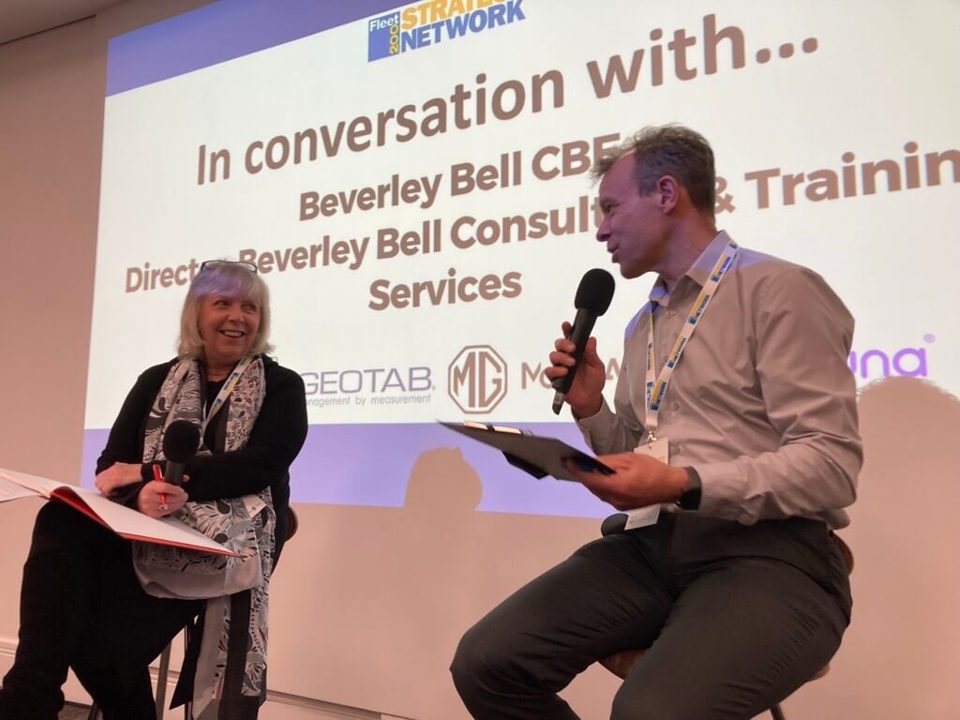Beverley Bell, a former senior traffic commissioner, has criticized the outdated restricted operator’s license system, emphasized the need for O-licensing updates and questioned the relevance of Driver CPC, suggesting it has been compromised.
The CBE holder (pictured) was in conversation with Fleet News’ group editor Stephen Briers, taking “gritty” questions submitted by fleet decision makers at the February Fleet200 Strategy Network meeting.
Stephen Briers: The restricted operator’s license, is it still fit for purpose, is it still relevant?
Beverley Bell: My view, and maybe some traffic commissioners, is that it’s had its day. Why would you have a difference in the licensing regime when the legislation that governs them is the same? If you make bread for a living, why would you put somebody in charge of 50 vehicles and say, they’re not quite like a bread van, they’re more dangerous, and you don’t need any qualifications?
If PM Keir Starmer could get rid of restricted licenses, I’d be very happy.
SB: Does operator’s licensing need a revamp? It’s complex. Could it be simplified?
BB: The rules aren’t complex. There’s only two parts to it, both essential, and then it’s about undertakings. The real issue is that it was 1995 when goods’ vehicle legislation came out. It needs updating. Why have we got three sets of drivers’ hours: why domestic, EU and working time? Why do different rules apply to different vehicles? Why do we have to put an advert in the newspaper when we want a new operating centre, as who reads newspapers now?
Another issue is how traffic commissioners interpret this legislation. Statutory guidance documents say they should interpret things in a particular way. But they don’t.
SB: We’re out of the EU. Is there still a place for driver CPC (certificate of professional competence) and is it still relevant?
BB: In my training company we started off doing driver CPC and stopped because we wanted to deliver a quality product, and didn’t want to be monitored by a man with a clipboard who failed you if you didn’t do the fire alarm test at the right time. You can just buy a CPC certificate off the shelf. Sometimes you don’t even have to do the course.
A reappraisal of the driver CPC legislation is long overdue as the whole system around it has been brought into disrepute. Trainers are supposed to be making money out of it, but how can they when they’re selling driver CPCs for 50 pence. So, they’re not. JAUPT and DVSA aren’t making money. I would venture to suggest it’s a tick box exercise.
SB: A question from a Fleet200 Strategy Network member: I’m increasingly seeing transport manager CPC (TM CPC) as a requirement on job ads. Is there a risk or prosecution to the certificate holder, for example, if a driver fails to comply with business standards by not doing a pre-drive check or driving on bald tyres?
BB: I don’t see any problem for an employer asking for it. If your driver adopts that attitude, it needs to be managed. If it isn’t the DVSA will visit you, then you’ll go and see those pesky traffic commissioners without coffee. 70% of prohibition notices are issued because the driver hasn’t done a daily walkaround check. Anything relating to undertakings like this can jeopardise your license, so monitoring is essential. Anything we can do to increase the professionalism of the sector is a good thing.
SB: A fleet has seen a lot of prosecutions due to workshop infringements and amended records. Do we need to tighten compliance and if so how do you get the balance right, particularly when there’s a shortage of workshop locations and skilled technicians?
BB: My wish at night is for the Department for Transport to regulate maintenance contractors: regulate and make accountable. We asked a client, why aren’t you doing laden roller break tests in every inspection. They said it was just for earned recognition operators. No it isn’t! It’s bad how much blame they can shift back to the operators. So, there’s a need to manage your maintenance contractor – or your in-house staff - and showing you’ve done it.
SB: Do you have any advice on the management of vans and how a traffic commissioner might view non-compliance in this area?
BB: Firstly, a traffic commissioner can take action against your license or you get prohibition notices on your vans, or you have incidents involving them. So, if you’re an O-licensed fleet, running vans, and one of them is involved in a serious incident or fatality, you need to report to a traffic commissioner.
Secondly, always do a daily walkaround check of a van, and record it. And vehicle inspections four times a year, maximum. But drivers are the biggest risk. The dog dies, they’re distraught; the wife moves out, they’re not. What happens affects their concentration behind the wheel. A van can kills a pedestrian as easily as a lorry.
So, what’s your drivers’ risk profile? What’s their driving record and history; have they made a health declaration (high blood pressure, diabetes, eyesight). Then what are the expected standards of driving in your organisation? What does your occupational road risk strategy say? This will include a record of driving hours and availability for work. Do any of your drivers have another job, maybe a bouncer at a local nightclub, do they do voluntary work or a firefighter, that will impact their sleep quality.
Then, do you train drivers, then monitor their behaviour (a buddy system)? Random alcohol and drug testing is important because abuse is going to increase exponentially. They don’t have drug abuse stamped on their forehead, so it’s not easy to spot.
SB: Is the increase in the number of touchscreens in vehicles leading to a greater risk of driver distraction?
BB: Absolutely. And it’s a massive issue for the commercial vehicle sector, whether that’s ‘buses, coaches, lorries, vans, whatever the vehicle. When I was a traffic commissioner, I watched a presentation from a truck manufacturer who were happy to tell the audience a driver could use his iPad while at the wheel. I asked if they had engaged with the regulators. The answer was no.
The risk of distraction is going to get worse. It used to be, don’t use a mobile phone while driving, but now in-vehicle tech is a growing danger.
SB: The growth in safety technology is worthy in its objective to protect road users and pedestrians, but several fleets have suggested that drivers will become too reliant on technology and ‘switch off’.
BB: I completely agree. Drivers have a difficult task. I had a hire car recently and there was a dinging noise. I didn’t know where it was coming, but I was within the white lines and the speed limit. I had no idea what it meant. There is the tendency to switch off or ignore these warnings. I’ve dealt with some awful incidents, when it’s too late for the car to take over.
SB: What are the worst cases; the most brazen operator?
BB: On my company’s courses we talk about non-compliance, which is typically due to arrogance, a lack of knowledge, inexperience and the wrong person in the wrong job.
A fellow traffic commissioner used to tell those sort of people to go sell double glazing. That way you won’t kill anyone.
There was one manager I took an operators’ license off when I was a TC. It didn’t bother him. He bought a truck and operated it without one. The DVSA took it off him. He applied for a new license through his wife. I asked her how many wheels there were on the truck – she didn’t know. Two years later, he’s back. Divored from his wife, but back with an ex he met on Friends Reunited. She was fed up with being a hairdresser and wanted to be a vehicle operator...
One case that has stayed with me involved a coach the operator had fitted with a worn 20-year-old tyre. https://www.bbc.co.uk/news/uk-england-25674077
The 63-year-old driver and two passengers were killed in a crash. The driver’s mother lobbied the Department for Transport hard and eventually legislation was changed to say you couldn’t put a tyre more than 10 years old on a steering axle.
It’s sad that an incident like this one has to happen to bring about change. I’d say don’t put a tyre that old on any axle too.
Can we take a moment to acknowledge the invisibility of success? Transport and fleet managers should be really proud of their safety record and trumpet it loudly. They all work to keep drivers safe, prevent deaths and injuries - and we don’t measure that.
Bio
Beverley Bell was appointed traffic commissioner for the North West of England in 2000, becoming the first female commissioner. She served as the senior traffic commissioner for Great Britain between 2012 and 2017. She was awarded a CBE in 2017 for services to road safety and the freight industry.
After her retirement in 2017 from her public role, Bell founded Beverley Bell Consulting. It was followed by the formation of Beverley Bell Training in 2021.
Source: https://beverleybell.co.uk/




















Login to comment
Comments
No comments have been made yet.